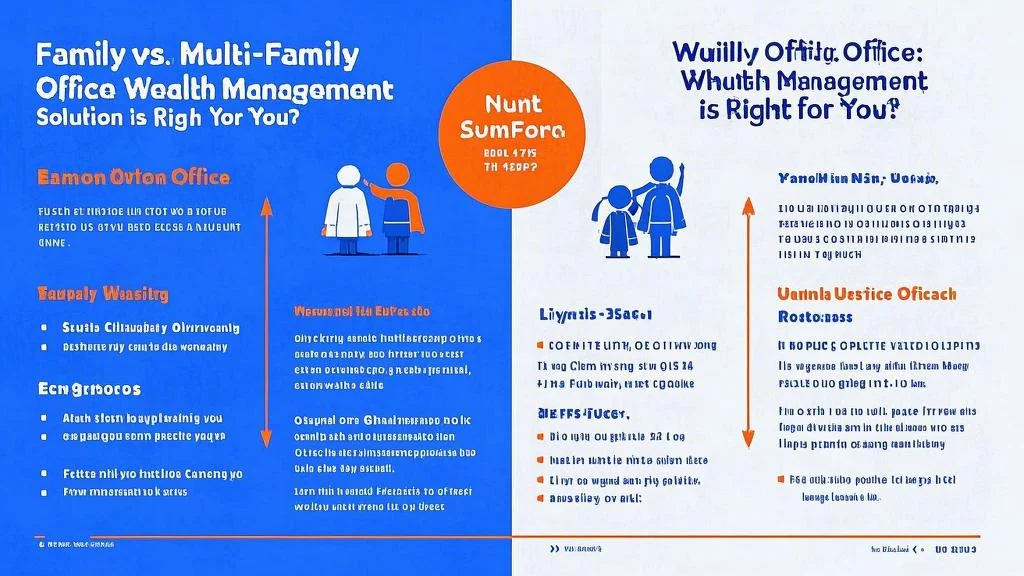Family Office vs. Multi-Family Office: Which Wealth Management Solution Is Right for You?

Understanding Family Office Services
For ultra-high-net-worth individuals (UHNWIs), managing wealth is not just about investments—it’s about creating a comprehensive strategy that addresses every aspect of their financial lives. This is where family office services come into play. A family office is a private wealth management firm that caters exclusively to a single wealthy family, offering a wide range of services tailored to their unique needs. These services often include high net worth investing, wealth transfer strategies, and estate planning. The primary goal of a family office is to preserve and grow the family’s wealth while ensuring it can be passed down seamlessly to future generations.
One of the key advantages of family office services is their ability to provide a fully customized approach. Unlike traditional wealth management firms, which often offer standardized solutions, a family office is entirely dedicated to the needs of one family. This allows for a level of personalization that is unmatched in the industry. For example, a family office might manage everything from investment portfolios and tax planning to philanthropic initiatives and lifestyle management. By taking a holistic approach to wealth management, family offices ensure that every aspect of the family’s financial life is aligned with their long-term goals and values. This level of attention and customization is particularly valuable for families with complex financial situations or significant assets.
What Is a Multi-Family Office?
While a single-family office serves one wealthy family, a multi-family office (MFO) caters to multiple families, offering many of the same services but on a shared basis. This model allows families to access the expertise and resources of a family office without bearing the full cost of maintaining a dedicated team. MFOs provide a range of services, including high net worth investing, wealth transfer strategies, and estate planning, making them an attractive option for families who want the benefits of a family office but at a lower cost.
One of the key benefits of a multi-family office is its ability to leverage economies of scale. By serving multiple families, MFOs can spread the cost of their services across a larger client base, making them more affordable than a single-family office. Additionally, MFOs often have access to a broader range of expertise and resources, as they serve clients with diverse needs and backgrounds. This can be particularly valuable for families who are looking for specialized services, such as international tax planning or philanthropic advisory. However, it’s important to note that the level of customization in an MFO may not be as high as in a single-family office, as the services are designed to meet the needs of multiple clients. For families who value cost-efficiency and access to a wide range of expertise, an MFO can be an excellent solution.
High Net Worth Investing: Tailored Strategies for Wealth Growth
Whether you choose a single-family office or a multi-family office, high net worth investing will likely be a cornerstone of your wealth management strategy. For UHNWIs, investing is not just about generating returns—it’s about creating a portfolio that aligns with their long-term goals, risk tolerance, and values. Family offices and MFOs specialize in creating customized investment strategies that go beyond traditional asset classes. This might include alternative investments such as private equity, real estate, or hedge funds, which can provide diversification and potentially higher returns.

One of the key advantages of working with a family office or MFO is their ability to provide access to exclusive investment opportunities. These firms often have deep networks and relationships with top-tier investment managers, allowing them to offer their clients opportunities that are not available to the general public. Additionally, family offices and MFOs employ sophisticated risk management strategies to protect their clients’ wealth. This might include hedging, diversification, and asset allocation techniques designed to minimize risk while maximizing returns. By taking a tailored approach to investing, family offices and MFOs help their clients achieve their financial goals while preserving their wealth for future generations.
Wealth Transfer Strategies: Ensuring a Smooth Transition
For wealthy families, transferring wealth to the next generation is one of the most critical aspects of wealth management. This is where wealth transfer strategies come into play. Both single-family offices and multi-family offices specialize in creating plans that ensure a smooth and tax-efficient transfer of wealth. These strategies might include setting up trusts, creating family limited partnerships, or using other legal structures to protect assets and minimize tax liabilities. The goal is to ensure that the family’s wealth is preserved and passed down according to their wishes.
One of the key challenges of wealth transfer is navigating the complex tax and legal landscape. Family offices and MFOs work closely with their clients to develop strategies that comply with all relevant laws and regulations while minimizing the tax burden on heirs. For example, they might recommend gifting assets during the client’s lifetime to reduce the size of the estate and lower estate taxes. Additionally, family offices and MFOs often provide education and guidance to the next generation, helping them understand their responsibilities and prepare for the future. By taking a proactive approach to wealth transfer, these firms help ensure that the family’s legacy is preserved for generations to come.
Estate Planning: Protecting Your Legacy
No wealth management strategy is complete without a comprehensive estate plan. Estate planning is about more than just distributing assets—it’s about creating a plan that reflects the family’s values and ensures their wealth is preserved for future generations. Both single-family offices and multi-family offices offer estate planning services, helping their clients create wills, set up trusts, and designate beneficiaries. The goal is to ensure that the client’s wishes are carried out and their heirs are provided for.
One of the key benefits of working with a family office or MFO is their ability to integrate estate planning with other aspects of wealth management. For example, they might recommend using a trust to protect assets from creditors or reduce estate taxes. Additionally, family offices and MFOs often provide ongoing support, helping clients update their estate plans as their financial situation or family dynamics change. By taking a holistic approach to estate planning, these firms help ensure that the family’s wealth is preserved and their legacy is secure. Whether you choose a single-family office or a multi-family office, estate planning will be a critical component of your wealth management strategy.